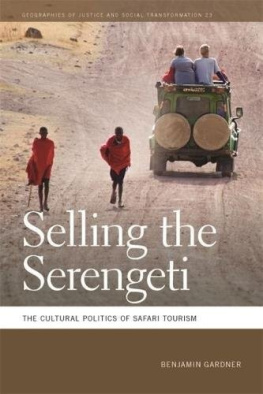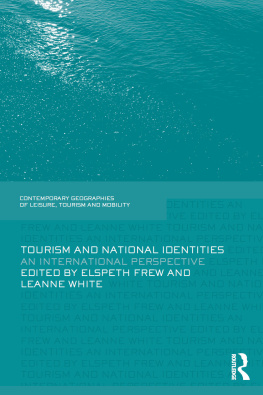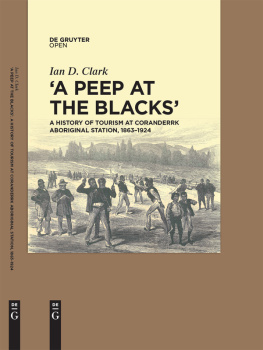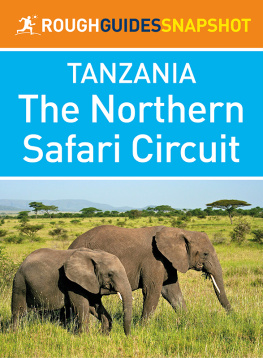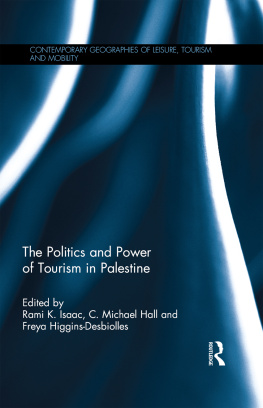Benjamin Gardner - Selling the Serengeti: The Cultural Politics of Safari Tourism
Here you can read online Benjamin Gardner - Selling the Serengeti: The Cultural Politics of Safari Tourism full text of the book (entire story) in english for free. Download pdf and epub, get meaning, cover and reviews about this ebook. year: 2016, publisher: University of Georgia Press, genre: Science. Description of the work, (preface) as well as reviews are available. Best literature library LitArk.com created for fans of good reading and offers a wide selection of genres:
Romance novel
Science fiction
Adventure
Detective
Science
History
Home and family
Prose
Art
Politics
Computer
Non-fiction
Religion
Business
Children
Humor
Choose a favorite category and find really read worthwhile books. Enjoy immersion in the world of imagination, feel the emotions of the characters or learn something new for yourself, make an fascinating discovery.
- Book:Selling the Serengeti: The Cultural Politics of Safari Tourism
- Author:
- Publisher:University of Georgia Press
- Genre:
- Year:2016
- Rating:3 / 5
- Favourites:Add to favourites
- Your mark:
- 60
- 1
- 2
- 3
- 4
- 5
Selling the Serengeti: The Cultural Politics of Safari Tourism: summary, description and annotation
We offer to read an annotation, description, summary or preface (depends on what the author of the book "Selling the Serengeti: The Cultural Politics of Safari Tourism" wrote himself). If you haven't found the necessary information about the book — write in the comments, we will try to find it.
Selling the Serengeti: The Cultural Politics of Safari Tourism — read online for free the complete book (whole text) full work
Below is the text of the book, divided by pages. System saving the place of the last page read, allows you to conveniently read the book "Selling the Serengeti: The Cultural Politics of Safari Tourism" online for free, without having to search again every time where you left off. Put a bookmark, and you can go to the page where you finished reading at any time.
Font size:
Interval:
Bookmark:

Selling the Serengeti
GEOGRAPHIES OF JUSTICE AND SOCIAL TRANSFORMATION
Series editors
Deborah Cowen, University of Toronto
Nik Heynen, University of Georgia
Melissa W. Wright, Pennsylvania State University
Advisory board
Mathew Coleman, Ohio State University
Sapana Doshi, University of Arizona
Zeynep Gambetti, Boazii University
Geoff Mann, Simon Fraser University
James McCarthy, Clark University
Beverly Mullings, Queens University
Harvey Neo, National University of Singapore
Geraldine Pratt, University of British Columbia
Ananya Roy, University of California, Berkeley
Michael Watts, University of California, Berkeley
Ruth Wilson Gilmore, cuny Graduate Center
Jamie Winders, Syracuse University
Brenda S. A. Yeoh, National University of Singapore
Selling the Serengeti
THE CULTURAL POLITICS OF
SAFARI TOURISM
BENJAMIN GARDNER
The University of Georgia Press
Athens & London
2016 by the University of Georgia Press
Athens, Georgia 30602
www .ugapress .org
All rights reserved
Set in 10 / 13 Minion Pro by Graphic Composition, Inc., Bogart, Georgia Printed and bound by Thomson-Shore
The paper in this book meets the guidelines for
permanence and durability of the Committee on
Production Guidelines for Book Longevity of the
Council on Library Resources.
Most University of Georgia Press titles are
available from popular e- book vendors.
Printed in the United States of America
20 19 18 17 16 p 5 4 3 2 1
Library of Congress Cataloging- in- Publication Data
Names: Gardner, Ben (Benjamin Richard), author.
Title: Selling the Serengeti : the cultural politics of safari tourism /
Benjamin Gardner.
Other titles: Geographies of justice and social transformation ; 23.
Description: Athens : The University of Georgia Press, 2016. | Series: Geographies of justice and social transformation ; 23 | Includes
bibliographical references and index.
Identifiers: lccn 2015015512 | isbn 9780820345079 (hardcover : alk. paper) |
isbn 9780820345086 (paperback : alk. paper) | isbn 9780820348186 (ebook) Subjects: lcsh: Maasai (African people)TanzaniaEconomic conditions. |
Maasai (African people)TanzaniaSocial conditions. | Identity
politicsTanzania. | NeoliberalismSocial aspectsTanzania. | Land
useTanzaniaSerengeti Plain. | Land tenureTanzaniaSerengeti Plain.
| Culture and tourismTanzaniaSerengeti Plain. | SafarisSocial
aspectsTanzaniaSerengeti Plain. | EcotourismSocial
aspectsTanzaniaSerengeti Plain. | Community- based
conservationTanzaniaSerengeti Plain.
Classification: lcc dt443.3.m37 g37 2016 | ddc 305.896 / 5dc23 lc record available at http: // lccn.loc .gov / 2015015512
For Jennifer, Stella, and Maylie
This page intentionally left blank
CONTENTS
This page intentionally left blank
Is the Serengeti a place or an idea? The stakes of this seemingly simple question lie at the heart of this book, as I have tried to understand how safari tourism has changed the very meanings and geographies of places and people living in the greater Serengeti region of northern Tanzania. I now realize that I was initially drawn to the idea of the Serengeti when I first went to Tanzania in 1992 as an undergraduate anthropology student. As much as I wanted to see Serengeti National Park and its surrounding areas with my own eyes, I know that I wanted to experience what I had already determined to be one of the most important and valuable places in the world. I didnt question why I believed the Serengeti was so important and valuable a place. I just knew it was. I didnt see the historical and geographical discourses that shaped my understanding of this place from the position of a white male student from the United States or how it was that I might be involved in preserving or protecting a particular image or representation of this place. After years of living and working in Tanzania and then researching the political economy and cultural politics of tourism in the Serengeti region, I have come to understand how the production of the Serengeti as both a place and an idea influences current debates and practices concerning economic development, conservation, and tourism in Tanzania.
As geographer Doreen Massey explains, places are always constructed out of articulations of social relations (trading connections, the unequal links of colonialism, thoughts of home) which are not only internal to that locale but which link them to elsewhere. Their local uniqueness is always already a product of wider contacts; the local is always already a product in part of global
forces (1995, 183). This idea of places and their pasts enables us to see the Serengeti not simply as the crown jewel of national parks in Africa but also as a landscape that has been produced in the image of an idea of African nature and what it should be. all uses the metaphor of the West and the Rest to describe how understandings ix
x Preface
and beliefs about the history and meaning of a specific geography and the actual lived experience of a place like the Serengeti are inseparable. He shows that the idea of the West came into being through a biased system of representation during a period of European exploration, expansion, and conquest that not only described the West as a place but also provided a set of criteria to evaluate its relative value, which provided a new logic to explain difference. A discourse is a way of talking about or representing something. It produces knowledge that shapes perceptions and practices (Hall 1992, 317).
Tourism in the Serengeti is more than the enjoyment or appreciation of African nature. It is a critical site where cultural, political, and economic ideas and practices shape the activities and encounters among tourists, tour companies, state agencies, local communities, as well as the flora and fauna. It is a particular form of consumption in which the commodity is the landscape itself. The idea of the Serengeti is a powerful one. Geographer Rod Neumanns groundbreak-ing book, Imposing Wilderness, describes the production of the dominant idea of nature in Africa. Neumann starts by quoting a traveling companion: This is the way that Africa should look (1998, 1). He draws on archival sources, as well as interviews with residents, to show how the production of nature in Africa transformed the identities and rights of African subjects. His research is a significant intervention in how understandings of African parks were forged through historical struggles over who should have rights and access to African natural resources. Neumanns book is essential reading for anyone interested in the relationship between protected areas and livelihoods around the world.
The contributions of scholars like Hall, Massey, and Neumann go well beyond learning important histories. They enable us to recognize how contemporary understandings, ideas, and practices draw their authority and even their legitimacy from the very discourses that shape what people value in a place like the Serengeti. How discourse shapes landscape became an important lens as I researched and observed different forms of tourism in the Serengeti region.
Tourism is commonly framed as a way to add value to place, where visitors will pay simply to passively enjoy the environment. Such narratives pay scant attention to how that environment is framed and preserved or to how prioritizing a certain kind of experience actually shapes the landscape in question. In one of the examples I discuss in this book, a U.S.based tourism company purchased a former barley farm in the middle of three Maasai villages to establish a nature refuge and promote ecotourism. As I describe in detail, the company met considerable resistance from Maasai residents, who claimed that it had received the land illegally and the refuge would dispossess them of essential grazing land that they had used for well over a century. In a promotional video made by the company in 2012, the owners of Thomson Safaris describe their project to pro
Next pageFont size:
Interval:
Bookmark:
Similar books «Selling the Serengeti: The Cultural Politics of Safari Tourism»
Look at similar books to Selling the Serengeti: The Cultural Politics of Safari Tourism. We have selected literature similar in name and meaning in the hope of providing readers with more options to find new, interesting, not yet read works.
Discussion, reviews of the book Selling the Serengeti: The Cultural Politics of Safari Tourism and just readers' own opinions. Leave your comments, write what you think about the work, its meaning or the main characters. Specify what exactly you liked and what you didn't like, and why you think so.

